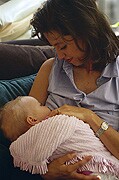- Could Your Grocery Store Meat Be Causing Recurring UTIs?
- Are You Making This Expensive Thermostat Error This Winter?
- Recognizing the Signs of Hypothyroidism
- 10 Strategies to Overcome Insomnia
- Could Artificial Sweeteners Be Aging the Brain Faster?
- Techniques for Soothing Your Nervous System
- Does the Water in Your House Smell Funny? Here’s Why
- Can a Daily Dose of Apple Cider Vinegar Actually Aid Weight Loss?
- 6 Health Beverages That Can Actually Spike Your Blood Sugar
- Treatment Options for Social Anxiety Disorder
Mom’s Epilepsy Drugs Appear Safe in Breast Milk


Taking epilepsy drugs while breast-feeding does not appear to harm the developing brains of young children, a new study finds.
There have been concerns that using epilepsy drugs while breast-feeding could pose a threat to youngsters because it’s been shown that some epilepsy drugs can cause cell death in young animals’ brains.
And in spite of the fact that epilepsy experts recommend breast-feeding, “it is still a sensitive topic among women with epilepsy,” noted one expert, Dr. Patricia Dugan, assistant professor of neurology at the Comprehensive Epilepsy Center at NYU Langone Medical Center, New York City.
“Despite reassuring published data, such as this article, patients frequently tell us that they receive contradictory advice from their obstetricians and pediatricians, resulting in a significant amount of distress for the mother,” said Dugan, who was not connected to the new research. “Hopefully, papers such as these will encourage everyone involved in the care of women with epilepsy to promote breast-feeding,” she said.
The new study included 181 children of mothers who had epilepsy and took drugs to control the condition. Nearly 43 percent of the children were breast-fed for an average of seven months.
IQ tests conducted on the children when they were 6 years old found no differences between those who were breast-fed and those who were not, according to the study published online June 16 in JAMA Pediatrics.
“Our study does not provide a final answer, but we recommend breast-feeding to mothers with epilepsy, informing them of the strength of evidence for risks and benefits,” wrote a team led by Dr. Kimford Meador, of Stanford University in California
Another expert said the study offers valuable information.
“The authors controlled for many of the factors that might influence the intellectual outcome of this large number of children,” noted Dr. Ian Holzman, chief of the division of newborn medicine at the Kravis Children’s Hospital at Mount Sinai in New York City.
“By following these children through age 6, they were able to present information relevant to the important issue of school performance,” he said. “This study allows us to counsel mothers who are planning to breast-feed that there doesn’t seem to be any harm [in taking epilepsy medications].”
Dugan said the study also hinted at other benefits for breast-fed children.
“It also showed that testing of breast-fed children at 6 years old — an age when more meticulous testing can be performed — reflected beneficial effects of breast-feeding, with higher IQ and better verbal abilities than nonbreast-fed children,” she said.
More information
The American Academy of Family Physicians has more about epilepsy and pregnancy.
Source: HealthDay
Copyright © 2026 HealthDay. All rights reserved.










